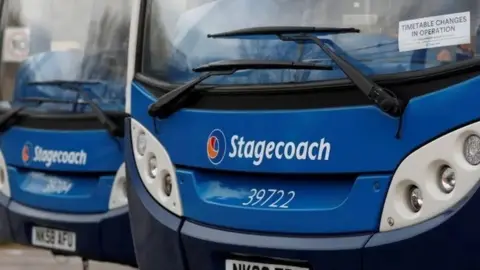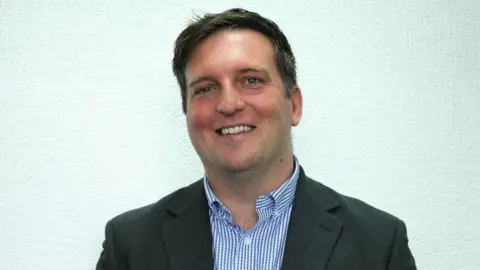Bus company 'short of dozens of drivers'
 Reuters
ReutersA major bus company is short of dozens of drivers in one county, its managing director has said.
In an interview with BBC Radio Gloucestershire Chris Hanson, the head of Stagecoach West since June, said Gloucestershire was about "65 drivers short".
A former bus driver himself, Mr Hanson said the company was working "to improve work-life balance" for its staff.
The Gloucester-based company has faced criticism in recent years for cutting routes, especially in rural areas, but said improvements have been made to its reliability.
The main driver shortage areas are Cheltenham, Stroud and Gloucester, the company said.
"The biggest challenge remains ensuring we have enough resource to do what we need to do - whether that be in the shape of buses or whether that be in the shape of drivers," said Mr Hanson.
Asked how the company was keeping its services running, Mr Hanson said they were about to "lend across" staff based in Oxfordshire, Swindon, Wiltshire and Bristol, where there is less of an issue with staffing.
He added that with a "challenging couple of years in terms of cost of living" in mind, the company was talking to unions representing drivers about pay and that it was focused on creating new rotas which give staff more balance in their working life.
"I always think back to my time as a driver and ask what that would look like for me, a lot of my colleagues do," Mr Hanson said.
"We're an industry full of people who have been on the frontline and really understand that challenge."
 Stagecoach Group
Stagecoach GroupIt was announced in last month's budget that the bus fare cap scheme, which had previously seen single bus journeys capped at £2 and was due to end at the end of this year, would be raised to £3 from January.
Bus companies have to sign up to the scheme, with Mr Hanson telling Radio Gloucestershire that they were waiting to see the detail of the new plan but were committed to preventing bus prices from rising dramatically.
Price rises 'not sustainable'
"What you can't do is just come to a cliff edge, the fares go up, and all of that good work that we've done getting people out of their cars and onto the buses will be entirely reversed," he said.
He added that the company had learned that "simplicity is the name of the game" when it comes to encouraging bus travel, with customers drawn to the clarity that comes with knowing a bus ticket will not cost more than £2.
While the cap was harder to introduce sustainably on rural routes, he said: "What we're absolutely certain of is that going back to our old fare model and just whacking the prices up is clearly not a sustainable option for customers and us."
Follow BBC Gloucestershire on Facebook, X and Instagram. Send your story ideas to us on email or via WhatsApp on 0800 313 4630.
